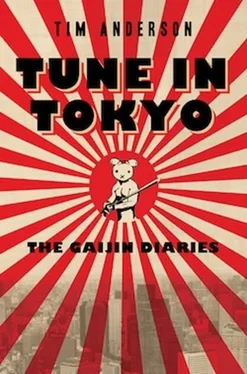“Shrink everything else,” I can hear the old Japanese samurai say as they collapse their swords down to something the size of toothpicks and place them in their back pockets. “But let the harp remain large enough to demand its own room.”
Yoko finishes setting the harp to the right pitch, grabs some sheet music off the bookshelf, and then brings a chair over and sits down with the harp before her. She slides the little string picks on her fingers, bends toward the harp, and begins to strum and sing along to an old Japanese ballad. It’s a vaguely familiar melody, yet I can’t figure out why.
“I’ve heard this before,” I say as Yoko continues singing and Fumiko starts picking her cuticles.
“Sakura…Sakura…Sana denchi to o-mo-u…”
Yoko stops. “You want play?” she asks.
“Oh, no, I can’t. I…” I can’t think of a decent reason not to. So Yoko stands and allows me to take her place in front of the harp. She instructs me briefly on how to read the notes of the Japanese score she’d been playing. Then she gives me the picks off her fingers so I can put them on. But I can’t. They’re too small for my fingers, naturally.
“No ploblem,” Yoko assures me as she goes into the other room. “More large size I have.” She reappears, bringing a few more picks for me to try on. As I attempt one after the other without success, I decide that big Western men were not meant to play this instrument.
“You can play no picks.” Freestyle.
I strum the notes of the song, and slowly, pluck by pluck, I get the hang of it. Yoko and Fumiko sit watching me, Fumiko intermittently gnawing on her fingernails and sucking up the blood, Yoko looking at her disapprovingly. There are lots of stops and starts and plenty of foul notes plucked, but I get through it without hurting myself or damaging the instrument, which I consider a victory. Yoko and Fumiko obviously do as well, for their applause at the end of my performance is impassioned and relieved.
It’s getting late, so after the women dismantle the harp again and dock it in another room, I gather my books and papers and prepare to leave. As I put the books into my backpack, Yoko tells me my homework is to learn to write the first ten characters in the Kanji book and to study the two phonetic alphabets, Katakana and Hiragana. I come very close to crying and begging for her benevolent mercy, but I can hardly say no after the good time she’s shown me.
So I tell her I’ll do my best, bow, say goodbye to Fumiko, who’s standing with her hands behind her back cracking her knuckles, give Yoko a gentle American handshake, almost fall over trying to put my shoes on while bowing and saying goodbye, and step out into the hall.
Yoko and Fumiko smile at me from the door as I walk to the elevator, their bright faces flanked by those of Bambi, Thumper, and a half dozen dwarves. All the way home I think of the gloating I’m going to do about all the Japanese culture I’d imbibed in one evening.
The next day at work, I walk into the teachers’ room and greet everyone warmly, waiting desperately for someone to ask me what I did last night or why I was in such a good mood or how to ask a Japanese taxi driver to drive me to the train station.
I see Joy and light up, because I know she’s also taught Yoko, and given her current interest in all things Japan, she’ll probably be very interested in hearing about my evening of cultural immersion.
“I had my first lesson with Yoko last night,” I begin.
“Oh, cool!” she said. “That’s great! Did she do the tea ceremony for you?”
“The what?”
“The tea ceremony. When I went a couple nights ago, she and Fumiko did a tea ceremony for me, and then we all sat around and took turns playing the Japanese harp. It was really fun.”
Am I just one of many? It can’t be. I am chosen.
“Oh, and she made yaki soba, and I learned how to give directions to a cab driver.”
“Uh…that’s cool. Yeah, we did all that.”
“She also showed me a little bit about Japanese flower arranging, which was kind of cool, because, you know, I was wanting to take a class or something, and now I think I’ll just pay her, you know, because she’ll give me a good rate I think, and she’ll, like, teach me Japanese at the same time. But you know what? To tell you the truth, I was most interested in the beautiful kimono collection she has. Did she show them to you?”
“No.”
“God, you should see some of the designs! Oh, and her bonsai garden! Absolutely gorgeous. That woman can do anything, I swear. Oh! And she wants me to teach her Spanish! Que magnifica, no?”
“Oh, yeah, Spanish, that’s great. And the bonsai garden was…you know, just totally amazing. Very artistic.” The lies just pour out of me.
I sit down to look at my first students’ folders and pick a lesson, wondering if I should ask if Joy knows about Yoko’s husband’s philandering and her problems getting Fumiko married. I decide not to, figuring I need to hold on to something of the whole Yoko experience that is mine and only mine, even if it’s also everyone’s.
I pick out a lesson for my class and pull out my new Japanese book, starting in on the first chapter.
The first bell rings, and the other teachers begin flooding in. Joy tells everyone about my night at Yoko’s, and the questions start flying:
“Did you have those tiny cakes?”
“Wasn’t her apartment beautiful?”
“Did she play you any Disney songs on the harp?”
“Fumiko is always messing with her fingers!”
Hmph.
So my experience at Yoko’s wasn’t my own. That’s OK. The key is that I have begun to break down that language barrier and expose myself to the other side of the world. And I’m eating some great food in the meantime. It will happen brick by brick and stone by stone, but it will happen, and one day, I’ll look straight through to where a wall once stood with my Western eyes and not only be able to give a taxi driver directions, I’ll be able to ask him his opinion of the flat tax and banter with him good-naturedly about how dumb the U.S. health care system is.
But let’s not get ahead of ourselves. There are some basics we must cover before shooting for the stars. Like talking about food in the free conversation room, for example.
I have a free period and decide I’ll pop in on Bob, a gigantically tall teacher from Wales who is in what we call the free-con room with about ten students.
I open the door and hear him saying, “Yeah, I really don’t like the taste; it just doesn’t appeal to me.”
I put on a smile as I look around at the students, all of whom have a look of utter horror on their faces.
Bob turns to me. “Tim, do you like manko?”
“Manko…manko…,” I think aloud. “Oh, manko! Isn’t that that bean paste stuff?”
He nods, looking around and wondering what the students find so horrifying about someone not liking manko.
“Yeah, I don’t like that either. The first time I ate manko I was expecting it to taste like chocolate, and it just didn’t at all.” I screw my face up into a look of distaste. “I was so disappointed. Because, really, what’s more delicious than a creamy, chocolate-filled doughnut?”
The students are still in shock about something, and a few of the ladies cover their mouths and giggle, red-faced. Things are clearly getting a little uncomfortable, so I do what I usually do when this happens. I walk out of the room and let the other person deal with it.
A few minutes later the bell rings and Bob comes into the teachers’ room looking redder than any Welshman I’ve ever seen.
“Oh my God, oh my God!!” he bellows in his resonant baritone. “I’ve just made an awful, terrible, horrible mistake! I can never go back into that room again! I want to die and be buried immediately. Immediately! Shit! Fuck!”
Читать дальше












